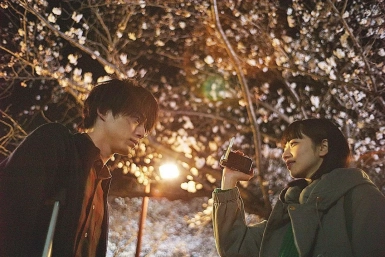In a year fraught with doom and gloom, music was an unfaltering light. They do say that despair brings better tunes (or something like that). From pop to hip-hop, with a sprinkling of rock, there was an awful lot of fantastic Japanese music released in 2024. Let’s have a look at our favorites.
Best Japanese Singles and EPs
Yuki Chiba — ‘Team Tomodachi’
Chiba had a phenomenal 2024, releasing “Mamushi” with Megan Thee Stallion (one of the biggest global hits of the year), announcing his first concert at Nippon Budokan and releasing his first album under his “Yuki Chiba” moniker in December. The single that started it all is likely “Team Tomodachi,” a raucous call-and-response track that spawned myriad remixes and covers. It’s easy to see why: “Team Tomodachi” is addictive.
Sam Gendel, Haruomi Hosono — ‘My Love Is Peach-Colored’
Regular Japan visitor Sam Gendel participated in a Hosono-masterminded cover project. The resulting cover album of Hosono’s 1973 debut, Hosono House — simply titled Hosono House Covers — contains a number of excellent covers, including the John Carroll Kirby and Mizuhara Sisters rendition of “Fuku Wa Uchi Oni Wa Soto.” The standout, however, is Gendel’s “My Love Is Peach-Colored,” a delightful meander through the world of Hosono via the lens of the famed saxophonist.
Hakushi Hasegawa, Kid Fresino — ‘Gone’
Taken from Hasegawa’s sophomore album, Mahogakko, “Gone” with rapper Kid Fresino serves as a testament to how far the singer-slash-producer has come since they first appeared on the scene back in 2017. Chaotic, skittering, frenetic and grounded, the song seems a paradox unto itself. It’s Fresino’s vocals that bring order to the chaos, leveling the track at a time when the melody explodes in all directions. A very fun listen that feels like coming out of the shower when it finishes.
三九 39 (Thank You) by Summer Eye
Summer Eye — ‘San Kyu’
Former Siamese Cats member Tomoyuki Natsume strikes out on his easy-listening solo project, Summer Eye. Taking inspiration from bossa nova, “San Kyu” is an ode to anyone and anything that’s ever helped him in the past. It’s a song I’ve had on repeat since it first came out in April.
XG — ‘Something Ain’t Right’
It wouldn’t be right to do a roundup of Japanese music and completely ignore the role that J-pop (or K-pop) has played in the industry. XG (which stands for “Xtraordinary Girls”) is a seven-member group made up of eager Japanese musicians based in South Korea. “Something Ain’t Right” is pop music done well: catchy, bouncy and fun.
Best Japanese Albums and EPs
Glans — Slow Tree
Young Sapporo band Glans has been quietly making waves in the underground scene since releasing its debut album on Gezan’s Jusangatsu label in May. Sounding a bit like a cross between previous Tokyo Weekender interviewees Goat (jp) and The Hatch, Glans brings a distinct pureness to the jazz/rock/experimental genre.
Skittering percussion tumbles throughout the album, whirling and gliding through phrases, off-notes and strums with joyous abandon. The band isn’t afraid of doing band-y things, like slowing down midway through the opener, “NIN,” essentially creating a raw drop effect of the sort you’d find in house music. This creates suspense as the song slows before gradually building back up again and hitting out with a punch and sounding a … bell?
Each song is completely different from the next. “Deep A” excels with tight drum patterns a la Goat (jp), while the following track, “Oceans11,” is nearly devoid of percussion — a pensive 7 minutes, 35 seconds of ambience, with a tiny bit of cheeky percussion appearing toward the end. “Ten” is a journey through blissfully layered drone and popping drums that gradually become more frantic as the song builds before dropping without warning and turning into something completely different. A uniquely accomplished album from new talent.
Diana Chiaki — Under Control
In October, Tokyo’s maven of underground darkness, Diana Chiaki, stepped up to Mar89’s new label, Nocturnal Technology, releasing a motorcade of songs that track the nighttime from dark to dawn.
Under Control starts at midnight, called “0:00” in the track listing, beaming out darkwave basslines foretelling of immense machinery to come. “01:00” (1 a.m.) continues in a similar vein, and bass starts to pound under a sexy synth line that purrs along the background. “02:00” is a night prowler, and come “03:00,” all hell is let loose. “03:00” opens with a growl that continues for almost a whole minute, until the beat finally drops and bass face production reaches 100%.
“04:00” is when we hit recovery and reflection, possibly away from the club for a breath of fresh air, catching sight of ourselves in a mirror, breathing in clear gulps of air. At “05:00,” the sun has risen and given us an appetite for heading back inside, which we do with gusto, dancing out the final hour before closing our eyes to sleep (this is a fictional world, after all, where teleportation is completely possible). Chiaki’s sound is raw and brooding throughout Under Control, a path from mayhem to reflection and freedom that merits multiple listenings.
Ringo Sheena — Carnival (Hojoya)
Ringo Sheena, Japan’s version of Kate Bush, released her first album in five years in May, a triumphant soundtrack-esque extravaganza featuring a host of female collaborators. A spectacle of camp that leans toward jazzier sounds, Carnival marks a departure from the output that made her famous, moving away from the more abrasive sound of her screaming younger years, back when she burst onto the scene in 1998.
The opener, “Offering Sake,” with Tricot singer Ikkyu Nakajima, boasts flute flourishes from famed wind player Takuo Yamamoto, who also contributes saxophone throughout. “I’m Free,” with violinist Neko Saito, a longtime collaborator, serves up carnival pomp topped with trombone, as Sheena’s distinctive shrill trills along.
“As a Human” moves on to reflection with full harp action. ”Open Secret” dances like a Moulin Rouge number, with an array of instruments on standby: Violin, trombone and saxophone all make an appearance, along with Sheena-style electric guitar. “The Sun & Moon” with Hikaru Utada, originally released as a single in 2019, is a lot calmer, with softer percussion than the other tracks on the album — a result of the collaboration, or, perhaps, the difference that five years can make. The pair’s harmonizing in the breakdown is a divine mashup of two different styles from two leading pop veterans of Japan’s music industry.
What makes Carnival notable isn’t simply how fun it is as an album; it’s a snapshot of important musicians from past to present. The album also features songs with key players from the new scene, like Atarashii Gakko and Gen Z singer-slash-rapper Daoko. Yet despite the wealth of collaboration, Sheena is easily discernible with her oft-copied, never-bettered huskiness that is instantly recognizable and sure to keep her in the business for years to come.
Nene — Super Hot
It’s really been a banging year for Yurufuwa Gang’s Nene. Live performance-wise, she performed at Coachella and went on a sold-out cross-country tour. In terms of creative output, she released a range of ridiculously hot videos — of which she’s all too aware, seeing as she named the album “Gekiatsu” in Japanese, which the official translation has down as Super Hot.
Super Hot is remarkably addictive, a trait that seems to follow Nene’s music. In 2023, I named Yurufuwa Gang’s album Journey one of the top releases of that year for its enjoyability and addictability, and this enjoyment is another big reason why Super Hot made the cut this year, too. With tracks like “Yummy” — whose refrain simply goes “Yummy, tsuki, yummy, tsuki” — and “Heavy,” a track featuring fellow rappers Dada and Watson, it’s hard to pick a standout, as each track on the album can be exactly that depending on the time you listen to it.
I’ve had this album on repeat since it was released in August, and each time I listen, I find a new part that either elicits approval or a little dance. Nene has been around, rapping on the scene, for over a decade, but it’s this album that really cements her position as a credible rapper.
Koshy on production duties excels throughout the album. From the imitable groove on “Spicy” to the sample from Cassie’s 2006 hit “Me & U” on “Heavy,” he creates tunes that allow Nene to show off her flow and ear for a good bar.
Conceive the Sea by marucoporoporo
Marucoporoporo — Conceive the Sea
Aichi-based singer and musician Marucoporoporo released her glittering album in May 2024. A wonderful mesh of shimmering textures and gorgeous sounds, it’s the ultimate in healing music.
Originally born as a project for an art installation in 2022, Conceive the Sea is a successful example of an art project turned into a fantastically captivating album. The title track, with sounds reminiscent of the lapping of waves on the seashore, invites us to do as the album title suggests. “Cycle of Love” is a glorious mix of electronic ambience and gentle guitar, as Marucoporoporo murmurs and croons us to sleep.
A personal favorite is “Double Helix,” an ASMR chorus of ear-friendly whisperings and gentle mutterings — a symphony of voice and sounds of synth. Meanwhile, “Core” is floating underwater, passing gorgeously colored coral and otherworldly shapes and patterns that build and swell, then dip back down once more.
A simply wonderful album, ideal for those times when you need a moment of quiet, peace and reflection. Perfect for reflecting on your 2024.
Watson — Soul Quake 2
Watson’s incredible flow and championing of his hometown, Tokushima, deserves a shoutout. His lyrics are luminary in their honesty, shouting out his mother who raised him alone, his regret at past actions and the rising cost of living.
The standout track on Soul Quake 2 has to be “Awaben,” which takes samples from the music used in Tokushima’s famous Awa Odori dance. Shamisen and the zomeki rhythm are not only fun to listen to but also provide the opportunity for Watson to show off his ear for a rhythm and versatile flow.









